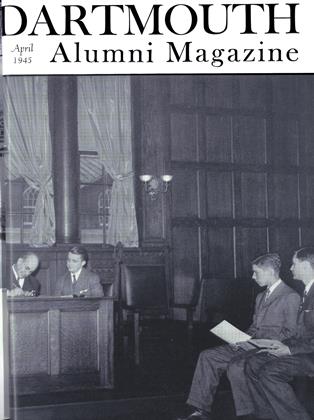The difference of opinion among the heads of American colleges as to compulsory military service in the United States seems to be chiefly a difference as to the proper time for discussion and decision. The numbers (14 college presidents for immediate action and 12 for postponing the discussion until after the war) indicate a practically even division. The slightly major fraction—with which President Hopkins is allied—stresses the advantage of acting while we are all keenly aware of the horrors of war and the danger that would be involved in waiting until later, when this country might easily be lulled into a false sense of security, as it was before. There is much to be said for this view, which the present writer inclines to approve; more, perhaps, than for the contention that it would be safer to wait until the world is calmer. The trouble is, notoriously, that when we are calmer we are prone to forget and slip back into a profound indifference to what we all would like to believe are conditions unlikely to arise again. If only they were as unlikely as we should like to think, this might not be so bad. The great trouble is, a realistic estimate indicates that, despite all our care and all our efforts at organization to insure world peace, the old dangers will remain. Once bitten, twice shy. World War I was fought with the idea that it was a war to end all wars and make the world safe for democracy. We are now approaching the end of World War II, little more than 25 years after the ending of the earlier war, and it has been a war dwarfing the former one in magnitude. Twice within the span of a generation we have been caught off balance and have been forced to improvise. Shall it be proven once again that "we learn from history only that men learn nothing from history?"
Of the details involved in compulsory military training for American youth no one at present has much to say. The question is one of the time for decision. Shall we take it up now, while the war is still going on? Or later, when we are beset by our propensity to forget?
 View Full Issue
View Full Issue
More From This Issue
-
 Article
ArticleRADIO WAVES AND RADAR
April 1945 By GORDON FERRIE HULL JR. '33, -
 Lettter from the Editor
Lettter from the Editor'Round the Girdled Earth
April 1945 By H. F. W. -
 Article
ArticleLaureled Sons of Dartmouth
April 1945 By H. F. W. -
 Class Notes
Class Notes1918
April 1945 By ERNEST H. EARLEY, DONALD L. BARR -
 Class Notes
Class Notes1945
April 1945 By ARTHUR NICHOLS -
 Article
ArticleMedical School
April 1945
P. S. M.
-
 Article
ArticleWe Shall Because We Must
May 1943 By P. S. M. -
 Article
ArticleHistory in the Colleges
December 1943 By P. S. M. -
 Article
ArticleGradus ad Quod?
February 1944 By P. S. M. -
 Article
ArticleCollege Glee Clubs
May 1944 By P. S. M. -
 Article
ArticleHurry, Hurry, Hurry!
August 1944 By P. S. M. -
 Article
ArticleWe, The People
August 1945 By P. S. M.







